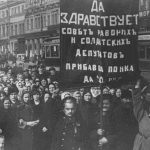The Hanoverian dynasty got its name from the city of Hanover, capital of Lower Saxony in Germany. In 1658 the grand-daughter of James I of England (and VI of Scotland), and daughter of Elizabeth of Bohemia, by name Sophia, married Ernst Augustus. He was the Duke of Brunswick-Luneburg, and became an Elector (Prince of the Holy Roman Empire with the right to elect the Emperor) of Germany in 1692. He took Hanover as his princely title and capital city.
It was Sophia and Ernst’s son (born 1660) who became George I, the first of the House of Hanover to be King of England (actually Great Britain and Ireland). Hanover as a territory contained important towns like Göttingen and Hildersheim. The defence of these places was to become a serious factor in British foreign policy during the eighteenth century.
So how was it that a full-blooded German ascended the throne of England? The answer is because George’s mother Sophia and her issue were recognised as heirs to the throne by the Act of Settlement in 1701, which excluded the Roman Catholic Stuarts. George moved to England to become king in 1714 on the death of Queen Anne – herself a descendent of Catholic Mary Queen of Scots.
George I did not speak English, did not like London, did not like British constitutionalism or the need to accept the limitations of Parliament; after being crowned he spent as much time as he could in Hanover, where he grudgingly agreed to be taught the English language. Throughout the rest of his life he spoke it with a heavy German accent. He reigned without the help of any queen, having divorced his wife Sophia Dorothea in 1694.
The Hanoverians reigned in Britain from George I to Victoria, 1714 to 1901. George was succeeded by his son George II, who
disliked and resented his father; however, he married very well with Caroline of Ansbach and accepted Walpole as his Prime Minister and adviser. Following family tradition he disliked his son Frederick Louis. On the positive side he was the last British King to lead his troops in battle, at Dettingen in 1743, while supporting Empress Maria Theresa in the War of the Austrian Succession. His despised son Frederick was the father of George III, the third of the Hanoverian succession.
This George was the first actually to be born in England! He was not a bad king at all but he suffered horribly from porphyria, a metabolic disease which causes mental disturbance, which is why most Englishmen thought their monarch was mad. The American colonies were lost during his reign, during one of the many Regencies required because of his mental state. In 1811 senility, deafness and blindness hastened the Regency of his son the profligate Prince of Wales (who invented Brighton).
This nasty piece of work succeeded as George IV in 1820. He was responsible for the decline in power and prestige of the British monarchy in the early nineteenth century. He had many mistresses, one illegal wife, the Catholic Maria Fitzherbert and a reluctant wife Caroline of Brunswick whom he treated appallingly. In 1830 he died and was succeeded by his brother William (‘Sailor King’) IV whose niece, thank God, was the future Queen Victoria. Her family name was that of her husband Prince Albert, but Britons did not take to the idea of a dynasty called Saxe-Coburg-Gotha so when her grandson George succeeded he was called Windsor instead.










Leave A Comment